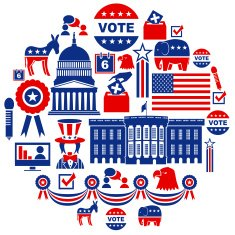Teens have mixed emotions about their peers voicing political opinions. Some believe it is a necessity for the future of voting while others believe it is a waste of time at this age. (Photo: public domain)
In these past months, most of the media has been revolving around the Presidential Election. From political ads on T.V to campaigners calling and texting, politics are everywhere.
This year many young people have become more interested and involved with politics and have found where they stand on political matters. Most of Leesvilles student body will be eligible to vote in the next presidential election. Teens have found ways to make their voices heard even though they are not of legal voting age yet. From Instagram posts to attending protests, the youth is trying to make a change. Some of their peers disagree with how vocal teens are getting.
In a poll of Leesville students, 69 percent of teens agreed they should voice their political opinion even though they can not vote.
“Teens Should Voice their Opinion”
Mena Choi, a sophomore, at Leesville believes it is important for teens to have opinions on important issues: “We are literally the face of the future and saying something now is important for our growth”, said Choi over text. Choi thinks that the only way for teens to grow to stay educated and create opinions on important issues now.
Kathryn Deary, a sophomore at Leesville, thinks it’s good practice for being able to maturely discuss politics as an adult. “If they start voicing opinions now, they learn how to voice opinions and stimulate discussion while still being respectful. However, if they do not voice their opinion in a civil manner, it can cause issues,” said Deary over text. She thinks that the most important part of discussing politics — especially at this age — is being respectful and open-minded.
Kristina Kasyoka, a sophomore, at Leesville agrees that now is the most important time for youth to speak out. “Teens vocalizing their political opinion is important because it spreads awareness on important issues and it reaches the audience of younger and impressionable voters. It also allows younger people’s concerns to be advocated for,” said Kasyoka over text. Kasyoka mentions that the next generation of voters is more impressionable.
This is the time in life where adolescents start to think for themselves, form their own opinions, and grow into their own person. Kasyoka believes that now more than ever is when teens should start being educated about important issues.
“Teens Should Stay Quiet”
Logan Bower, a junior at Leesville, feels that teens aren’t educated enough to talk on political matters. “Too many of them are immature and don’t have reliable sources right now, they just believe what they hear on T.V or see on social media,”said Bower over text. Bower believes that teens need more time to grow and develop while accumulating knowledge to form an opinion in the future.
Cooper Epps, a freshman at Leesville, thinks most of the “activism” that is done by teens doesn’t have any real effect on our society. “The way their opinions are displayed are in ways that don’t help anyone or anything. Reposting on social media isn’t gonna do anything but doing real research and spreading real information is what they’re missing”, said Epps over text.
Epps brings up the idea of performance activism — “activism done to increase one’s social capital rathert han because of ones devotion to a cause”.
Gabe Sherman, a sophomore at Leesville, agrees with this view. “A lot of people will just repost something to their story or using a stupid hashtag instead of actually going out and making a difference.”
Nina Hamon, a sophomore at Leesville, thinks that most of the debating that takes place at a young age just turns into arguments and causes even more conflict. “No one can vote yet so what’s the point in burning bridges and causing arguments, this just makes us even more divided”, said Hamon over text.
She believes that teens don’t understand yet how to have mature and respectful conversations about politics yet.
“It Depends”
Isaac Gardner, a sophomore at Leesville, is torn when it comes to how he feels about teens speaking out. “I think it’s good for teens to be educated but some people take it too seriously like their whole Instagram feed is nonstop politics for no reason,” said Gardner over text. Gardner feels that some of his peers take political issues too far and seriously considering they aren’t eligible to vote yet. Lily Williamson, a sophomore, agrees with Gardner that this is a complicated issue to say yes or no to. “ Everyone has views. But at the same time they can’t vote you know,” said Williams over text.
Whether or not teens feel that themselves or their peers should voice their opinion, in four short years most of them will be eligible to vote. These next four years will be a time of growing and learning for almost everyone.

Hi! My name is Amelia and I am a staff writer for The Mycenaean. I also play club volleyball and enjoy spending my free time with friends and family.

Leave a Reply